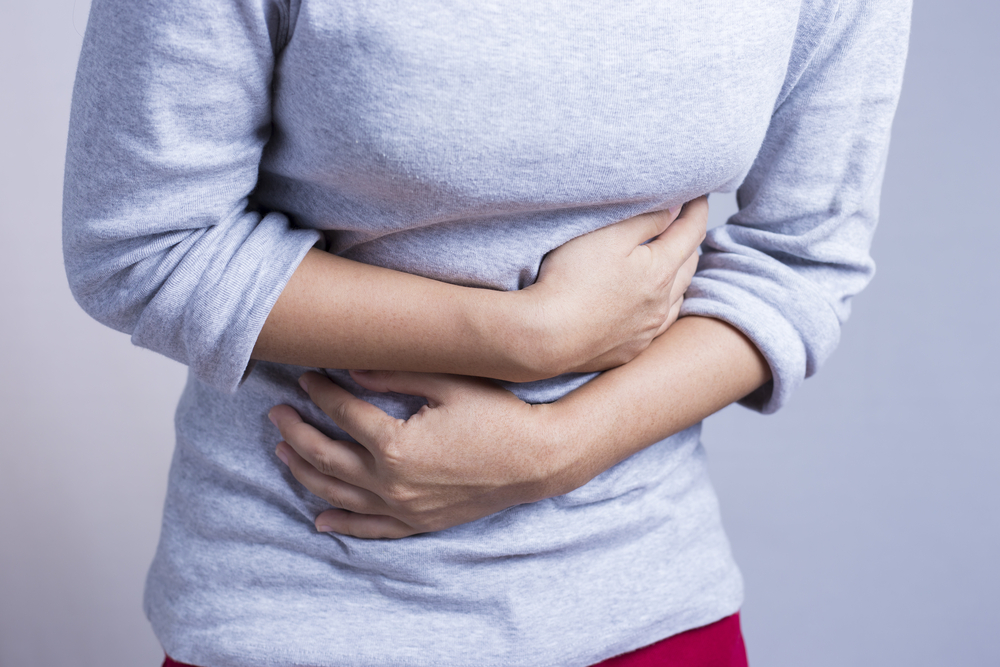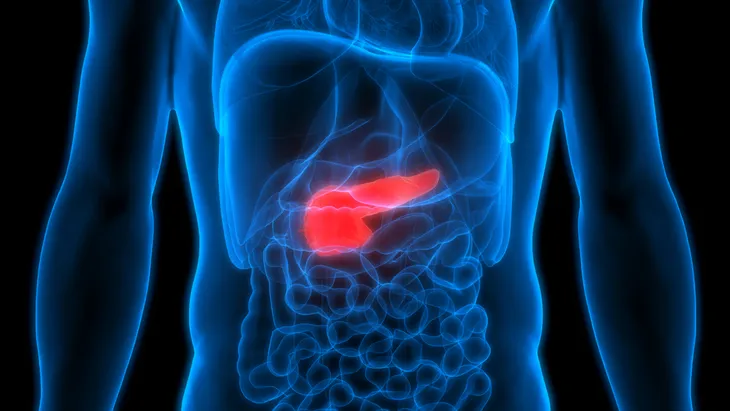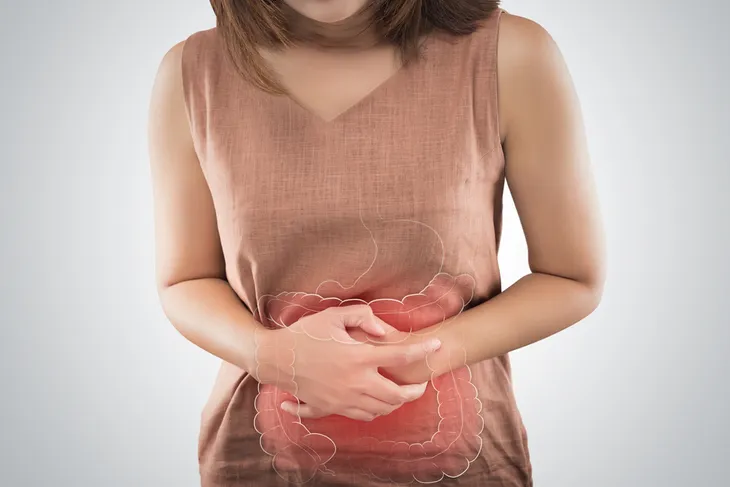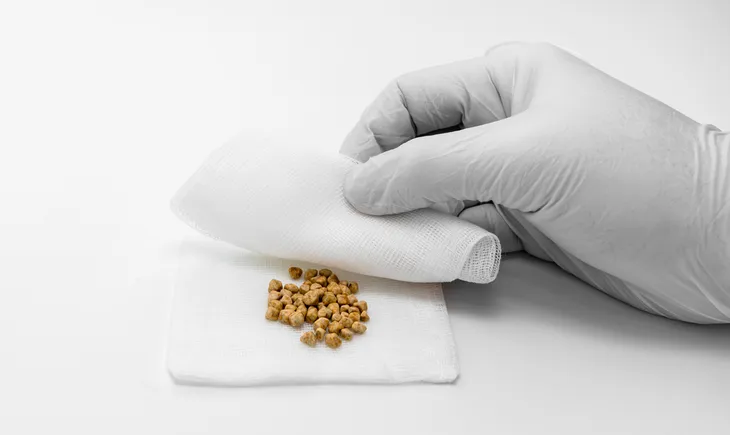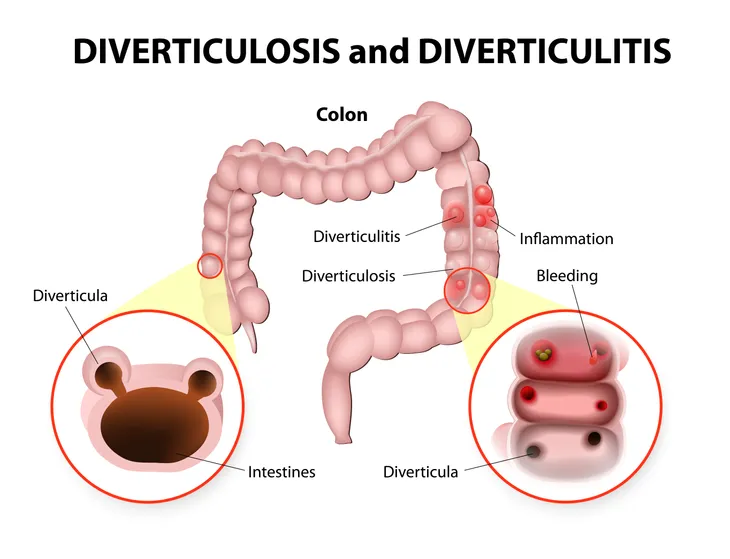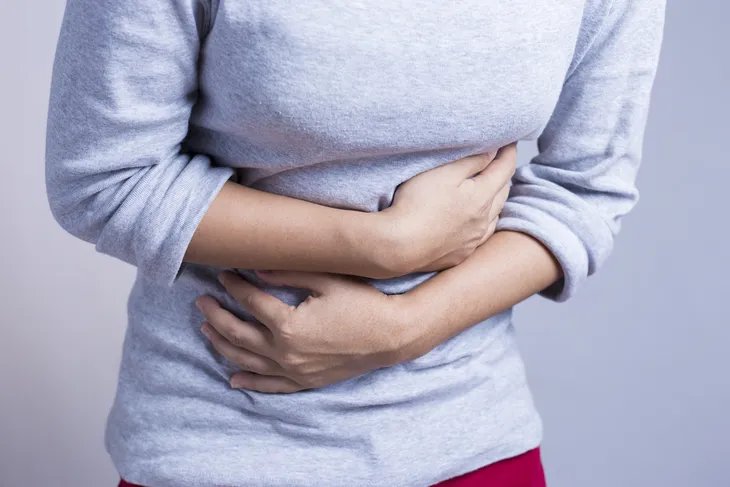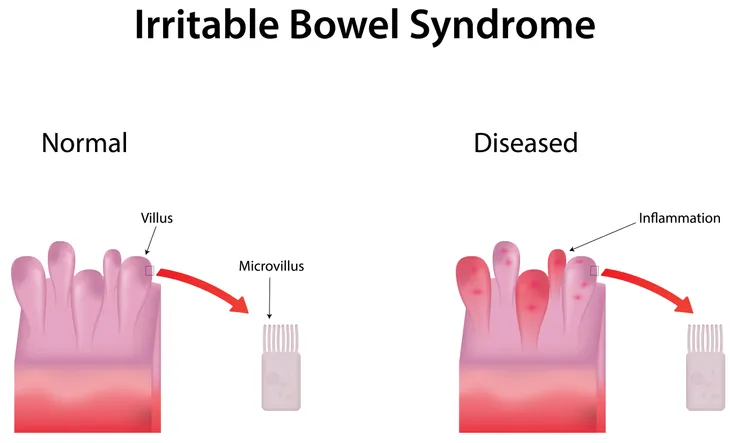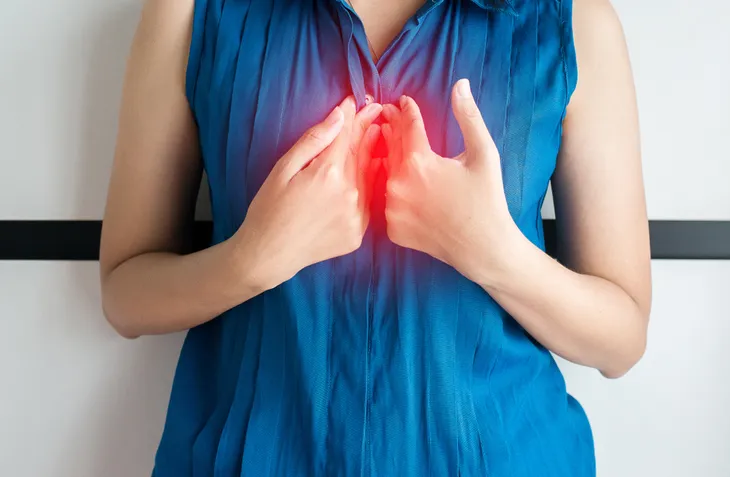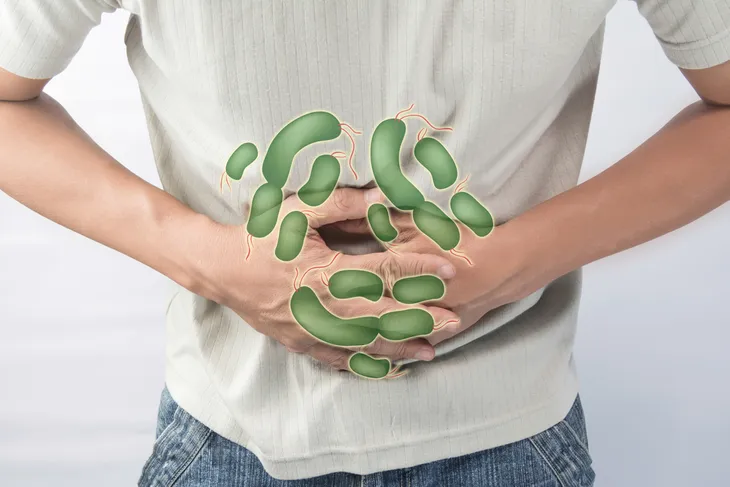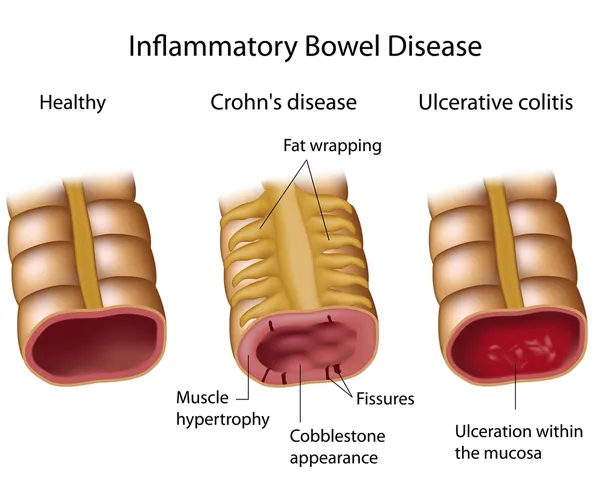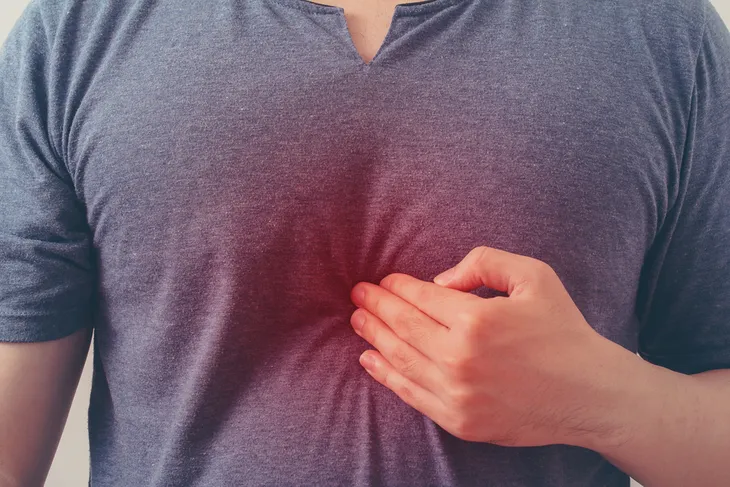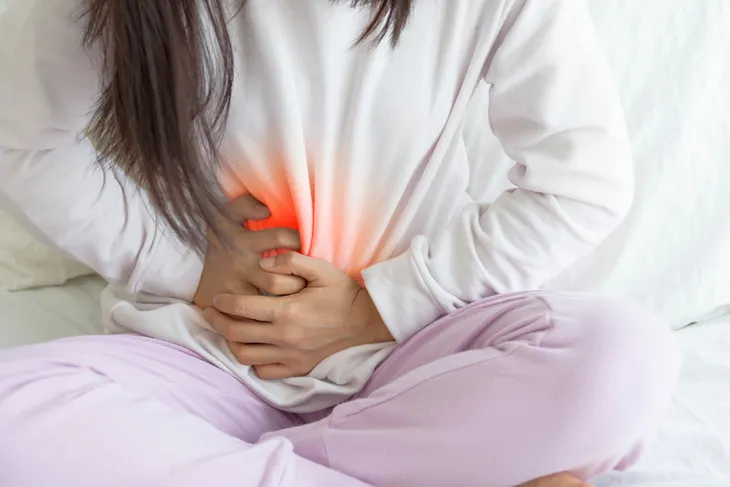You’re fully aware when one strikes—the gassy, bloated, and turbulent discomfort of a stomachache. However, figuring out the direct source can be a different predicament altogether with almost any organ (i.e., the small or large intestine, liver, pancreas, gallbladder, spleen, and kidneys) in your abdomen being the origin.
Here are 15 of the most common medical causes of stomach ache…
Want diet & nutrition content delivered straight to your inbox? Sign up for our exclusive diet & nutrition newsletter!
1. Lactose Intolerance
According to the National Institute of Diabetes and Digestive and Kidney Disorders, roughly 65-percent of the world’s population suffer from lactose intolerance, which is a type of food intolerance that results in gas, bloating, burping, indigestion, nausea, diarrhea/constipation, and abdominal cramps, after consuming dairy products.
Lactose intolerance is typically caused either by lactase deficiency (the small intestine produces reduced levels of lactase, which aids digestion) or lactose malabsorption (in which undigested lactose is abnormally absorbed in the colon). The best option to reduce symptoms is to avoid dairy products (e.g., cheese, milk, ice cream, and butter).
2. Gluten Intolerance
Gluten sensitivity describes an intolerance to a protein present in rye, wheat, and barley. This shouldn’t be mistaken for celiac disease (or gluten allergy), which is an immune system reaction to gluten that causes damage to the small intestine and prevents the absorption of food nutrients. Even a tiny amount of gluten will cause extreme pain and intestinal damage to patients with celiac disease.
If you’re intolerant to gluten, on the other hand, consuming gluten may cause painful abdominal cramps, bloating, gas, diarrhea/constipation, and exhaustion after you consume products that contain rye, wheat, or barley.
3. Pancreatitis
The inflammation of the pancreas (the flat gland located behind the stomach in the upper abdomen) will undoubtedly lead to abdominal pain, along with a burning or shooting pain resonating in the upper or mid-abdomen and vibrating up the back and causing severe nausea and even vomiting. Healthline also lists worsening pain after eating, fever, rapid pulse, and tenderness on the abdomen as symptoms of pancreatitis, or inflammation of the pancreas.
John Hopkins Medicine notes that pancreatitis can occur as a sudden acute attack that comes on quickly and lasts for several days or a chronic condition that occurs over the span of several years. Gastroenterologists at Detroit’s Henry Ford Hospital point to excess alcohol intake as the main cause of acute (sudden) pancreatitis and chronic (long-lasting) pancreatitis. Both forms can be life-threatening and disrupt the manner in which the body is able to process glucose (or sugar).
4. Endometriosis
Endometriosis is a painful uterine condition that strikes women. It’s caused when the cells of the uterine wall migrate to other areas of the pelvis, causing painful abdominal cramps, irregular periods, spotty bleeding, and even infertility.
A pelvic ultrasound is necessary to diagnose a woman with endometriosis. If confirmed, depending on the severity, pain relievers, hormone therapy, and/or surgery may be viable options.
5. Ulcers
According to the medical experts at WebMD, roughly one in 10 Americans will develop a peptic or gastric ulcer in their lifetime. However, the burning pain that takes root in the stomach or duodenum (the first portion of the small intestine) will be impossible to ignore. Reader’s Digest notes that ulcers often cause a dull, burning abdominal pain that can only be relieved by taking antacids. Peptic ulcers are unfortunately quite common. They show up on the lining of the stomach or top of the small intestine and cause “bloating, burping, poor appetite, and weight loss.” The pain is usually more severe soon after eating or when lying down due to pressure placed on the stomach.
Many people assume ulcers are caused by stress, but Reader’s Digest assures they’re not. Although the production of excess stomach acid is considered a prime culprit, a bacterial infection, taking certain medications (i.e., non-steroidal anti-inflammatory drugs [NSAIDs] such as ibuprofen, naproxen, and aspirin), heavy drinking and smoking are all considered causes of ulcer. The bacteria (Helicobacter pylori or H. pylori) that is commonly associated with ulcers can be diagnosed with a simple blood test.
6. Gallstones
Hard deposits of bile and other digestive fluid, also known as gallstones, can cause painful abdominal inflammation, because they develop within the gallbladder (the abdominal organ located just underneath the liver). The gallbladder is responsible for storing and secreting bile for fat digestion, and when its main duct is blocked by a gallstone, it causes characteristic abdominal pain. According to Healthline, gallstones are one of the most common causes of abdominal pain on the upper right side of the abdomen.
The pain associated with gallstones most often follows a rich or fatty meal and is said to last anywhere from several minutes to a few hours. While they are a fairly common problem and can be treated with gallbladder removal surgery (most often) or by medication to dissolve the gallstones (less often), they can be quite serious if they block the gallbladder’s duct. In this case, they’ll cause upper abdominal pain along with “pain in your right shoulder, nausea or vomiting, back pain between your shoulder blades, and sudden and intense pain in the middle of your abdomen, underneath your breastbone,” writes Healthline.
7. Diverticulitis
Diverticulitis is characterized by the development and painful inflammation of diverticula, which are tiny pouches (sacs) in the lining of the large intestine (or colon). As foreign materials (i.e., stool) passes through the colon, these small sacs can become blocked, swollen, and infected.
Symptoms such as severe lower stomach cramps, rectal bleeding, blood in stool, and abscesses are not pretty. In severe cases small tears (or perforations) can form in the intestines and require emergency surgery.
8. Parasites
If you like to swim in questionably clean lakes, ponds, or pools, you could be risking a nasty parasite infection that can cause a myriad of tummy troubles, including painful cramps, bloating, diarrhea, nausea, gas, and digestive upset.
According to the U.S. Centers for Disease Control and Prevention (CDC), parasites, most likely Cryptosporidium or Giardia in North America, take up residence within the digestive tract a few days to a week following exposure. Keep in mind that drinking from a contaminated water source, drinking unpasteurized beverages (i.e., apple cider), or eating contaminated or undercooked food can also leave you with a parasitic souvenir.
9. Irritable Bowel Syndrome
Irritable bowel syndrome (often called simply IBS) most often causes stomach cramps, alternating constipation with explosive diarrhea, gas pain, and extreme bloating. Lawrence J. Brandt, MD, Emeritus Chief in the Division of Gastroenterology at Montefiore Health System told Reader’s digest that IBS is one of the most common gastrointestinal disorders out there. It affects about 10- to 20-percent of Americans, most of which are women.
Medical professionals will typically determine IBS following testing to rule out a series of other more gastrointestinal diseases, such as inflammatory bowel disease (i.e., ulcerative colitis and Crohn’s disease), which can lead to painful inflammation, ulcers, scarring, and blockage in all parts of the digestive tract.
IBD and IBS are not the same. The Mayo Clinic stipulates that while IBS can be safely managed with an elimination diet and pain relievers, IBD can cause fatigue, malnutrition, extreme weight loss, rectal bleeding, infection, and in extreme cases, lead to colon cancer.
10. Gastroesophageal Reflux Disease
Gastroesophageal reflux disease (GERD) strikes the valve that prevents stomach acid from washing up into the esophagus. As the valve weakens, stomach contents splash up back into the esophagus at the back of the throat leading to heartburn, lower chest burning, and upper abdominal discomfort. In addition to these three main symptoms, GERD can also cause “chest pain, problems swallowing, backflow of food or sour liquid, or a feeling of having a lump in your throat,” says Healthline. If it’s occurring at night it can also cause a “chronic cough, worsening asthma, sleep issues, or laryngitis,” adds Healthline.
GERD is exacerbated by diet, specifically the eating of fatty, rich foods. However, symptoms can be controlled with prescription antacids and H2 blockers as well as via weight loss, diet, and by refraining from the urge to overeat.
11. Food Poisoning
Food poisoning is a quick way to a unhappy digestive system. Caused by the presence of a nasty bacteria (i.e., salmonella) or viruses, an outbreak of food poisoning will quickly, and often explosively, result in gas pain, abdominal cramps, bloating, nausea, diarrhea, and even vomiting.
The symptoms of food poisoning are often mistaken for gastroenteritis (the “stomach flu”), however, food poisoning usually subsides within a few days once the food is eliminated by the digestive tract. In elderly, young, or immune compromised patients, food poisoning can be fatal and requires immediate medical attention.
12. Constipation
Constipation is something most people suffer from time to time, and while it can be extremely uncomfortable causing sharp gas pains in the abdominal area and bloating, it’s a fairly normal problem and easy to fix. John Hopkins Medicine says, “People who are constipated often have a feeling of being bloated and full, and their abdomen may even become visibly distended.”
13. Inflammatory Bowel Disease
Inflammatory bowel disease (IBD) causes abdominal pain, cramping and even rectal bleeding. It’s often confused with irritable bowel syndrome (IBS), but while they sound the same, they are actually quite different! Reader’s Digest notes that IBD is actually much more rare and serious. Faten N. Aberra, MD, an Assistant Professor of Medicine in the Division of Gastroenterology at the University of Pennsylvania in Philadelphia told Everyday Health that one in five people suffer from IBS, whereas IBD occurs in about one in 200 Americans.
Not only is it much more rare than IBS, but IBD is a lot harder to diagnose because it’s actually “an umbrella term” for other conditions such as Crohn’s disease and ulcerative colitis. WebMD says a doctor is able to detect IBD after doing a scan or endoscopy (a flexible tube with a light source at the end) of the intestines, which would show chronic inflammation and ulcers.
14. Heartburn
Location is a good place to start when it comes to diagnosing the problem. For example, Reader’s Digest says heartburn often occurs as a burning pain in the center of the abdomen and tends to show up after a big greasy meal. Dr. Brandt points out that “burning” is the distinguishing factor for heartburn, which is typically followed by a bitter taste in the mouth.
“Acid reflux is the regurgitation of partially digested liquids or foods that have mixed with stomach acid. This acidic mix makes its way into your esophagus (food tube) and throat, causing a burning sensation,” writes Reader’s Digest. The source also notes that occasional heartburn is nothing to worry about. It only becomes a problem if it’s a chronic condition such as acid reflux or GERD.
15. Appendicitis
Appendicitis can be quite painful and unpleasant, as it’s often due to an infection. It causes the appendix to become inflamed and filled with pus, and in many cases, it has to be surgically removed before it bursts (or ruptures). The National Institute of Health (NIH) says it’s the leading cause of emergency abdominal operations in the U.S.
In order to tell if you’re abdominal pain is from appendicitis, you should take tally of any other symptoms that might also be occurring. For example, appendicitis tends to occur alongside a low-grade fever, lower back pain, diarrhea or constipation, inability to pass gas, bloating, nausea and/or vomiting, and loss of appetite. You should also take note of where the pain is located (appendicitis causes a sharp pain in the lower right abdomen), and whether pressure on the area causes the pain to increase. If you think you’re suffering from appendicitis, you should seek medical attention right away.
